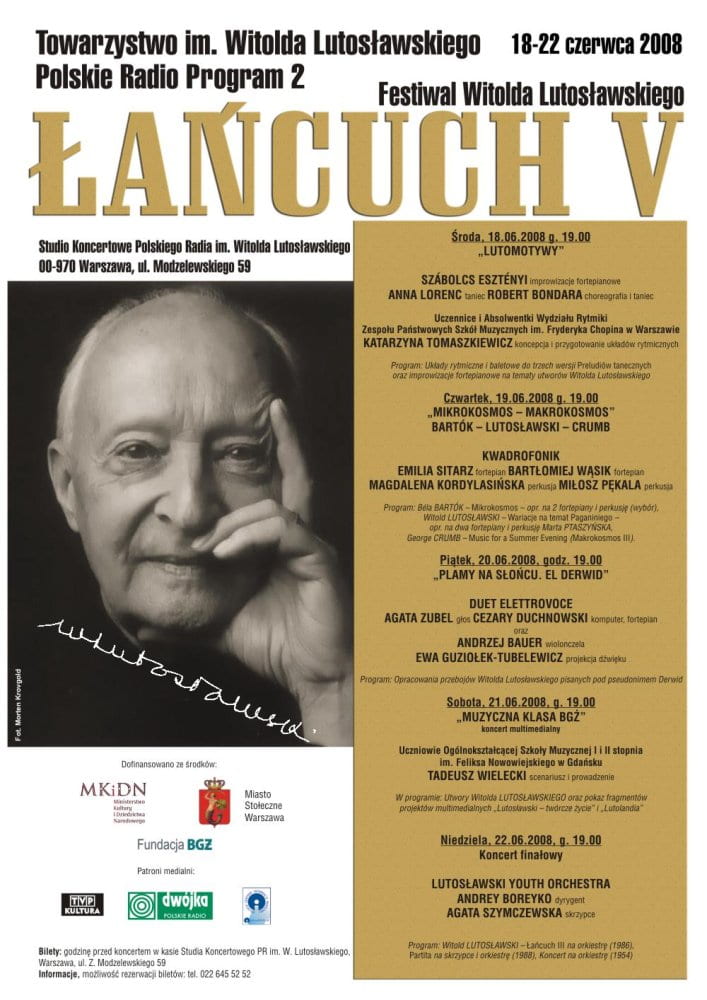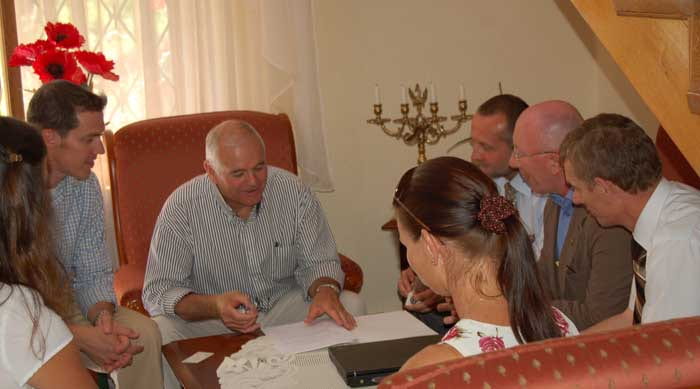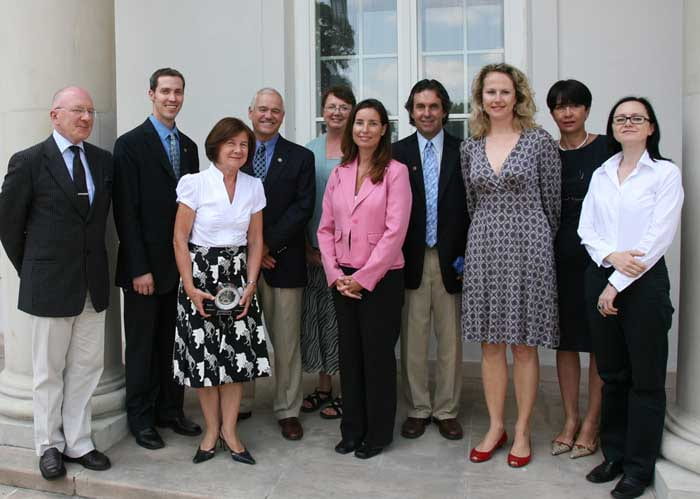Polish Music Center Newsletter Vol. 14, no. 7
PMC News
In Paderewski’s Footsteps—From California To Poland
Sponsored by Poland’s Ministry of Foreign Affairs, a delegation of members of the Board of Directors of the Paderewski Festival in Paso Robles made an official visit to Poland from June 24-28, 2008. The delegation was headed by Frank Mecham, mayor of Paso Robles, and included Marek Zebrowski—Director of the Polish Music Center at USC and Board member, Joel Peterson—President of the Paderewski Festival Board of Directors, Steve Cass—Board of Directors member and owner of Cass Vineyards, Paula O’Farrell—Festival Archivist and Historian, and Rachel Hamilton—Paderewski Youth Competition Coordinator. The idea for this trip originated with Consul General Paulina Kapuścińska’s visit in Paso Robles for the Paderewski Festivals in 2006 and 2007.
The group’s itinerary began in Kraków on Tuesday, June 24, with a visit to the Grunwald monument, funded by Paderewski and dedicated at a special ceremony commemorating the 500th anniversary of the Battle of Grunwald in 1910. Shown around Kraków by Professor Małgorzata Perkowska, the delegation continued with a visit to the Paderewski Archives at the Musicology Department of the Jagiellonian University. Professor Perkowska introduced the group members to Paderewski’s library, photos, music, and other important documents left to the University by this great pianist, patriot and statesman.
A busy agenda of meetings in Kraków included a detailed discussion of cultural exchanges between musicians from Poland and California with the US Consul for Culture, Susan Parker-Burns. Similar topics were also covered during a meeting with the Vice-President of the Jagiellonian University, Professor Szczepan Biliński.
 The next item on the itinerary was a visit to the Jagiellonian University Museum—a repository of over 600-year long academic tradition that included treasures from the days of Copernicus’ study there, and a Pleyel grand piano that once belonged to Chopin (pictured at right).
The next item on the itinerary was a visit to the Jagiellonian University Museum—a repository of over 600-year long academic tradition that included treasures from the days of Copernicus’ study there, and a Pleyel grand piano that once belonged to Chopin (pictured at right).
A visit to the Royal Castle at Wawel was followed by a visit to the Czartoryski Museum. Director Tadeusz Dziurzyński introduced the group to the extraordinary collection of objects belonging to the one of the most important families in the history of Poland. The core of the collection consists of the military trophies from the glorious days of the Polish “winged horseman” cavalry, as well as a priceless collection of paintings by Leonardo da Vinci and Rembrandt.
On Wednesday, the group travelled to Kąśna Dolna, an estate located about two hours southeast of Kraków and owned by Paderewski from 1897-1903. Director Krystyna Szymańska led the tour of the manor house, the office building and hotel, and the large barn that is being refitted to serve as a 400-seat concert hall. The Supervisor of the Tarnów district, Starosta Mieczysław Kras, was also present. The visitors from California walked the extensive grounds laid out by Paderewski with a beautiful linden alley and other rare species of trees. Later in the afternoon, Director Szymańska treated the group to a sumptuous lunch in Paderewski’s own dining room. Discussions included showcasing the winners of the Paderewski Youth Competition in Paso Robles during concert series in Kąśna Dolna, and the regional authorities prepared a draft of a preliminary agreement for such exchanges that may be signed later this fall in Paso Robles.
Thursday, June 26, was the first of the two days the delegation spent in Warsaw. An early morning visit in the Ministry of Culture was followed by a visit with Poland’s First Lady, Madame Maria Kaczyńska, in the Presidential Palace. The California delegation was invited to tea and refreshments with the First Lady and her staff in the Blue Salon of the Palace. Paulina Kapuścińska, Consul General of the Republic of Poland in Los Angeles, was briefly able to join the group during this highly significant meeting.
During the early afternoon, the delegation was shown around the Royal Castle in Warsaw by its curator, Juliusz Zamecznik. This fascinating tour gave a glimpse of the heroic past of the castle and its treasures that were partially saved before this landmark was heavily damaged in German air raids in September 1939.
Later that same afternoon, the delegation was received at the Headquarters of the Kosciuszko Foundation in Warsaw. The host, Joseph Herter, provided the refreshments and spoke about the Foundation’s history and programs. Public Affairs Officer for the U.S. Embassy in Warsaw, Edward J. Kulakowski was also present, and discussions centering on academic and artistic exchanges as well as visa issues were held.
Towards the evening, the group visited the Museum of Warsaw Uprising. The displays and exhibits of this fairly new and excellent institution powerfully illustrate the tragic days of August-September 1944, when Poles rose against German occupation, trying to liberate their capital.
Friday morning the group strolled through the beautiful grounds of the Łazienki Palace in Warsaw. The early morning sunshine did not yet penetrate the cool, shaded walkways of the grounds, and the stillness of the park was only occasionally disrupted by mating calls of numerous peacocks, freely roaming around. At 9 a.m. the group met with Karol Radziwonowicz, the Director of the Paderewski Museum at the Łazienki Palace. Mr. Radziwonowicz performed at the Paderewski Festival in Paso Robles in the mid 1990s, and remembered Virginia Peterson, the grandmother of the current Board of Directors President, Joel Peterson.
Later that morning the delegation drove to Żelazowa Wola, Chopin’s birthplace some 30 miles outside Warsaw. A quick visit to the manor house and the surrounding park was followed by a return to Warsaw for afternoon meetings, including one with the Director of the Adam Mickiewicz Institute, Pawel Potoroczyn. The Mickiewicz Institute was the main organizer of the delegation’s visit, while the Ministry of Foreign Affairs covered the costs of lodging, transportation within Poland, and meals for the group. At night, the group was invited to attend a performance of Mozart’s Requiem, given by the chorus and soloists of the Warsaw Chamber Opera and Warsaw Chamber Orchestra in the Seminary Church on Krakowskie Przedmiescie.
The last day, Saturday, began with the group’s early morning departure for Bydgoszcz. On the way, the delegation had a chance to quickly see Toruń with its magnificent Gothic architecture. Having been invited by Henryk Martenka of the Paderewski Music Association in Bydgoszcz, the California visitors then witnessed the official dedication of the Paderewski International Airport that included a special concert and reception. Mayor Frank Mecham spoke to the four hundred guests assembled in the recently completed new terminal. Following the festivities, there was a special banquet at the Paderewski Music Society headquarters in Bydgoszcz, attended by Konstanty Dombrowicz, the President of the City of Bydgoszcz, who then gave a special private tour of the City Hall and Bydgoszcz Market Square to the American delegation. Later that evening, members of the delegation returned to Warsaw and departed for California on Sunday.
Overall, the Paderewski Festival Board members were able to meet with numerous important officials in Poland and identify many areas of future cooperation in the area of cultural and commercial exchanges. Members of the delegation have uniformly stressed the importance of learning the details of Poland’s history in the context of Paderewski’s activities as a pianist, patriot, and statesman. Contacts with individuals and institutions that were initiated during this short but important fact-finding trip will be followed by more detailed agreements and reciprocal visits in the future.
[MZ]
Letter From Żeleński To Stojowski
 Note: The following rare letter was generously donated to the Polish Music Center by Stojowski scholar Joseph A. Herter. The donation was officially made at the Koszciuszko Foundation in Warsaw while PMC Director Marek Zebrowski was visiting Poland with the Paderewski Festival Board delegation.
Note: The following rare letter was generously donated to the Polish Music Center by Stojowski scholar Joseph A. Herter. The donation was officially made at the Koszciuszko Foundation in Warsaw while PMC Director Marek Zebrowski was visiting Poland with the Paderewski Festival Board delegation.
In his very short biography of Zygmunt Stojowski written in 1949, only three years after the composer’s death in New York, musicologist Józef Reiss noted Stojowski’s historical significance, stating that “It is proven by Stojowski’s rich archive of correspondence with such masters as J. Brahms, Saint-Saëns, César Franck, Debussy, [and] Tchaikovsky.”1 Yet, Reiss’s list was only a sampling of Stojowski’s collection of letters from famous composers that Reiss presented. It is now known that the collection also included multiple letters from Paderewski and Delibes as well as this recently purchased letter written by Władysław Żeleński. It was bought by Joseph Herter from Gary Combs Autographs in New York City.
Many of the Stojowski Collection letters were unfortunately sold over the past two decades to various collectors by the composer’s son, Henry (b. 1921), a retired architect currently living with his daughter, Nancy, in Richmond, Virginia. With the exception of the Tchaikovsky letters, none of the correspondence was transcribed or copied for research purposes before sale. A postcard to Stojowski from Ludomir Różycki (1883-1953) is probably the only correspondence item from noted composers in the Collection. The remaining part of the Collection (musical manuscripts, printed scores, recordings, photos, programs and newspaper clippings as well as other correspondence) was donated by Henry and his older brother, Alfred (b. 1919), a retired medical doctor living in the state of Washington, to the Polish Music Center at the University of Southern California in October 2006. The Żeleński letter returns now to its place in the Zygmunt and Louisa Stojowski Collection.
Żeleński’s long four-page 8vo letter to Stojowski, dated April 28, 1892, begins by stating how happy he is because of Stojowski’s fame and then extends his congratulations to his former pupil for his Parisian triumphs with hopes that his “name will shine on the artistic horizon like the name of our beloved Paderewski.” He then gives his best wishes to Zygmunt for his upcoming name-day on May 2, the feast of Saint Sigismond. Later in life, Żeleński continued to show his admiration for Zygmunt by dedicating to him his orchestral piece, Suite de Danses Polonaises, Op 47.In an earlier letter Stojowski must have included a program on which he performed Żeleński’s works because the letter continues by commenting on them.
The letter also gives insight into the musical life of Cracow, including preparations being made by a Cracovian committee of artists for the Viennese Theatrical-Musical Exhibition of 1892,2 of Żeleński’s fear and dislike of performing in public for Cracow audiences, and the frustration he experienced in feeling that his music was not adequately acclaimed by the city’s critics, especially by a certain Franciszek Byliński. Written during Żeleński’s work on his opera Goplana, the letter expresses hope that the opera’s success will finally allow the composer to leave Cracow. Alas, in spite of Goplana’s success, Żeleński spent the remaining 29 years of his life in Poland’s ancient capital.
The letter ends with some family gossip regarding the wedding of his nephew Władek Żeleński. It appears that practically nobody was invited to attend except for the closest family members. The letter closes with the sending of hugs for both Zygmunt and his mother, Marie (1850-1925), who was an inseparable and domineering force in Stojowski life. The letter is signed, “Your ever loving W. Żeleński.”
[Joseph A. Herter]
Kraków, 28 April 1892
Dearest Zygmuś!3
May 2 is approaching.4 I shall finally dispatch a letter to you, so that it arrives before it becomes stale. There is nothing more I could wish for you, for I am content that on the occasion of your name day I can congratulate you on your artistic triumphs and successes. May the Lord grant that your name doth shine as brightly on the artistic horizon as that of our beloved Paderewski. I received the concert program and I sincerely thank you for remembering me; I can imagine how well the Sonata was performed. Jaruchy must have been sung by a baritone, since it is written for a mezzo or a high baritone voice.
Just today we had a conference regarding Polish programming at the musical exhibition;6we placed the Intermezzo and Theme and Variations on the program, and you could also appear as a soloist with piano compositions. Count Cieszkowski,7 Noskowski,8Niewiadomski,9 Tomkowicz [?]10 and Mr. Bylicki11 were present. We discussed a lot but I have no idea as to the final results. As far as I am concerned, I do not trust this enterprise since I have little faith in Cieszkowski’s or Bylicki’s intensions towards me, especially the latter’s who had recently allowed himself to lecture on the development of music since 1848.12 He dealt with Europe rather briefly but Poland was taken to task. Moniuszko and Noskowski did not escape criticism and, as far as I know, I got the brunt of it, for in spite of both talent and knowledge, he considered Wallenrod a work without merit.13 There were only a few listeners but those present spoke angrily about some parts of the lecture, proving their points by quoting from the lecture in a newspaper. This is just his attitude towards me. He has decided to sink my efforts. Of course I must ignore it, but I’m also angry with the local apathy since nobody came forward to protest selecting an artist residing in the city as the subject of public lecturing. I wonder whether similar practice exists elsewhere. I have no doubt that the exhibit in Vienna will be helpful for other Polish artists, but—given the facts—I do not believe in results favorable to me. I did not back out only for reasons of solidarity, but hold no illusions about the outcome.
Right now I work mainly on Goplana.14 Perhaps this opus will allow me to reach a wider audience and allow me to leave Kraków. I feel constrained, sad, and have no desire to play for anyone, never mind public performances, God forbid.
A great event in our family—on Saturday the 30th of this month Tadzio is getting married. Except for parents and brothers needed as best men, the rest of the family are excluded.15Mr. Słonecki seems to be ashamed of his very tall daughter. My brother is quite saddened and I am somewhat angered by such treatment of family relationships, but the entire matter is of no consequence to me and I am not upset by it. I conclude my jeremiad by warmly embracing you and your Mother.
Your ever loving W. Żeleński.
Notes
- Józef W. Reiss, Statkowski, Melcer, Młynarski, Stojowski. Kraków: Wiedza Powszechna Wydawnictwo Popularno-Naukowe, 1949, p. 22.
- For more information on the Viennese Theatrical-Musical Exhibition of 1892, see the currently unpublished paper of Prof. Magdalena Dziadek, Dyskusja wokół wiedeńskiej wystawy teatralno-muzycznej z 1892 roku jako antecedens porównawczej metody rozważania problemu narodowości w muzyce, soon to be published by the musicology department at the Chopin University of Music in Warsaw.
- Zygmunt Stojowski (1870-1946), pianist, composer and professor of music.
- Feast of Saint Sigismond.
- The Song of Jarucha (1879) to the text by Józef Ignacy Kraszewski was later used in the second act of the opera Stara baśń.
- The Theatrical and Musical Exhibition in Vienna (June-September 1892) featured two operas Krakowiacy i góraleby Kurpiński and Halka byMoniuszko, presented by the Lwów Opera Company. Between the acts of Halka, Edward Reszke, a famous Polish bass and accompanist Franciszek Bylicki, performed songs and arias by Tchaikovsky, Meyerbeer, Moniuszko and Jozef Wieniawski.
- Count Zygmunt Cieszkowski was a cellist and president of the Polish Committee for the Exhibition in Vienna. During the years 1887-1894 he served as secretary of the Friends of Fine Arts Society in Kraków.
- Zygmunt Noskowski (1846-1909), composer, conductor and professor of music.
- Stanisław Niewiadomski (1857-1936), composer, professor of music, and music critic.
- Stanisław Tomkowicz (1850-1938), an art historian from Kraków.
- Franciszek Bylicki (1844-1922), a pianist and music journalist in Kraków.
- The Spring of Nations began in January 1848 with an uprising in Sicily and was followed by riots in France in February that spread to the entire European continent, including Germany, the Habsburg Empire, Western Poland, Wallachia, and Rumania. Eventually the revolutionary movement also reached Brazil.
- Konrad Wallenrod, an opera in four acts to the libretto by Zygmunt Sarnecki and Władysław Noskowski-Łada, based on a poem by Adam Mickiewicz. The world premiere was given by the Lwów Opera Company on 26 February 1885.
- Goplana, an opera in three acts to the libretto by Ludomił German, based on a poem Balladyna by Juliusz Słowacki. The world premiere was given by the Kraków Opera Company on 23 July 1896.
- Władysław Żeleński, the composer, was born in 1831 and died in 1921. He had two brothers: Stanisław and Kazimierz. “Władek” (the diminutive of Władysław) Żeleński [1866-1941], who is mentioned in the letter, was the son of Stanisław..
News
Impressive Honors For Mykietyn’s 2nd Symphony
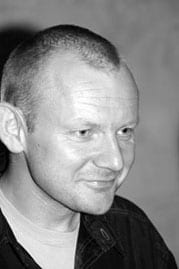 International radio representatives from 29 national radio networks on four continents participated in the 55th International Rostrum of Composers (IRC) in Dublin, Ireland from June 9-13th. These members presented 51 works composed within the five years preceding the Rostrum. From among these works, they chose Paweł Mykietyn’s Symphony no. 2, which was premiered at the 2007 Warsaw Autumn Festival, for their list of nine “Recommended” compositions. L’Heure Bleue (2007) for orchestra by Japanese composer Misato Mochizuki from the “general” category and Mémoire du vent (2006) for orchestra by French composer Florent Motsch from the “composers under 30” category were chosen as this year’s “Selected” compositions, the event’s top honor.
International radio representatives from 29 national radio networks on four continents participated in the 55th International Rostrum of Composers (IRC) in Dublin, Ireland from June 9-13th. These members presented 51 works composed within the five years preceding the Rostrum. From among these works, they chose Paweł Mykietyn’s Symphony no. 2, which was premiered at the 2007 Warsaw Autumn Festival, for their list of nine “Recommended” compositions. L’Heure Bleue (2007) for orchestra by Japanese composer Misato Mochizuki from the “general” category and Mémoire du vent (2006) for orchestra by French composer Florent Motsch from the “composers under 30” category were chosen as this year’s “Selected” compositions, the event’s top honor.
Founded in 1949 upon the request of the Director General of UNESCO as the advisory body to the agency on musical matters, the IRC functions as an independent international NGO maintaining a formal associate relationship with UNESCO. Having pursued its mission to promote contemporary music creation through broadcasting for more than half a century, the annual Rostrum has over the past few years reinforced its role as one of the most important “rendez-vous” for professional exchange between radio producers. Its initial objective remains fostering the exchange of performances of contemporary music between broadcasting organizations. For example works chosen at the preceding Rostrum (2007) were given over 500 broadcasts by participating networks as well as affiliates of the European Broadcasting Union (EBU), and these compositions are often recommended for inclusion in concert repertoire.
 On June 27, 2008, the winner of the “Opus” award of the Public Media in Contemporary Music was announced during a gala in the Lutosławski Concert Studio of the Polish Radio. Paweł Mykietyn’s Symphony no. 2 was unanimously chosen by the members of the jury, who stressed that this work stood out because of its originality, stylistic uniformity, perfection of form, feeling for musical time, and great internal power. Prof. Włodzimierz Kotoński, chair of the jury, shared the following during the ceremony:
On June 27, 2008, the winner of the “Opus” award of the Public Media in Contemporary Music was announced during a gala in the Lutosławski Concert Studio of the Polish Radio. Paweł Mykietyn’s Symphony no. 2 was unanimously chosen by the members of the jury, who stressed that this work stood out because of its originality, stylistic uniformity, perfection of form, feeling for musical time, and great internal power. Prof. Włodzimierz Kotoński, chair of the jury, shared the following during the ceremony:
One of the jurors said that we have several very good compositions and one work of art. Another mentioned that we have witnessed the birth of a talent comparable to Witold Lutosławski from his best period.
Dębski Ballet Premiere
 The Kielce Dance Theatre and Świętokrzyskie Philharmonic Orchestra, conducted by Jacek Rogala, premiered a new ballet entitled Zdarzyło się w Jeruzalem[It happened in Jerusalem] on June 26th and 27th. The music for this production was written by Polish composer Krzesimir Dębski. The decorations were designed by Boris Kudliczka and choreography by Elżbieta Szlufik-Pańtak and Grzegorz Pańtak. Solo vocal parts were performed by Jorgos Skolias.
The Kielce Dance Theatre and Świętokrzyskie Philharmonic Orchestra, conducted by Jacek Rogala, premiered a new ballet entitled Zdarzyło się w Jeruzalem[It happened in Jerusalem] on June 26th and 27th. The music for this production was written by Polish composer Krzesimir Dębski. The decorations were designed by Boris Kudliczka and choreography by Elżbieta Szlufik-Pańtak and Grzegorz Pańtak. Solo vocal parts were performed by Jorgos Skolias.
The ballet is based on the forbidden love idea of Shakespeare’s Romeo and Juliette, with the updated setting of today’s Middle East. It tells a story of love between a Palestinian girl and an Israeli boy. The ballet has received a warm review from Gazeta Kielce which you can read here: miasta.gazeta.pl/kielce. For more about the Kielce Dance Theatre please go to: www.ktt.pl.
Kilar’s New Film Score
 The National Polish Radio Symphony Orchestra, conducted by Wojciech Michniewski, has finished recording the soundtrack to Krzysztof Zanussi’s latest movie, Serce na dłoni[Heart in the Palm of the Hand]. The score was composed by Wojciech Kilar, who is the composer for most of Zanussi’s productions, including: Struktura kryształu, Constans, Kontrakt, Brat naszego Boga, and Cwał.
The National Polish Radio Symphony Orchestra, conducted by Wojciech Michniewski, has finished recording the soundtrack to Krzysztof Zanussi’s latest movie, Serce na dłoni[Heart in the Palm of the Hand]. The score was composed by Wojciech Kilar, who is the composer for most of Zanussi’s productions, including: Struktura kryształu, Constans, Kontrakt, Brat naszego Boga, and Cwał.
Serce na dłoni is a Polish-Ukrainian co-production staring Nina Andrycz, Stanisława Celińska, Bohdan Stupka, Szymon Bobrowski, Maciej Zakościelny, Agnieszka Dygant and Borys Szyc. The premiere of the film is scheduled for autumn of this year.
Szymanowski At Bard Summerscape
ANNANDALE-ON-HUDSON, N.Y. – Bard SummerScape’s exploration of “Prokofiev and His World” will be enriched by productions of two rapturous works by Polish composer Karol Szymanowski – a contemporary and friend of Prokofiev’s – opening Friday, July 25 for a run of five performances through August 3. Under music director Leon Botstein, SummerScape’s resident American Symphony Orchestra will play both the acclaimed opera King Roger (The Shepherd) and Harnasie, a pastoral dance by the composer who is widely considered the father of modern Polish music. The Wrocław Opera Chorus will perform, with Polish vocal soloists (see below) and a children’s choir. Both works will be directed and designed by Lech Majewski.
Karol Szymanowski (1882-1937) set philosophical issues to a glorious score in his 1924 opera King Roger (The Shepherd), a work of volcanic emotional and spiritual intensity, in a libretto he wrote in collaboration with Jaroslaw Iwaszkiewicz. The title character, an enlightened twelfth-century Sicilian monarch, discovers that a mysterious shepherd, who preaches a gospel of erotic abandon, is challenging his authority. King Roger, seeing his queen and court seduced by the shepherd’s revolutionary credo, angrily confronts him, only to experience a rapturous revelation that fuses his rational and sensual selves. The 90-minute opera was given its premiere in Warsaw in 1926, to enormous critical acclaim. In a CD review in Gramophone magazine, King Roger is described as “a ravishingly beautiful opera,” with “orchestral textures [that] are voluptuously rich and subtly colored.”
Szymanowski’s 1931 pastoral dance Harnasie – another rarely-performed masterpiece – will precede each performance of King Roger. Like his countryman Frédéric Chopin, Szymanowski was frequently inspired by Polish folk music, in this large-scale work as elsewhere, and the establishment of an independent Poland after World War I no doubt heightened his sense of artistic patriotism. Harnasie tells the story of a reluctant peasant bride who falls in love with an outlaw named Harnas, the leader of a gang of mountain bandits. This remarkable hybrid work, which is based on a scenario by Jerzy Rytard and the composer himself, features a transcendent score that includes a tenor soloist and a massive choir. It is considered the crowning achievement in Szymanowski’s theatrical output, and has been favorably compared with Bartók’s Cantata Profana, among other works.
As Ruth Ochs observes, in notes to an essay that appears in Bard’s program for the double bill, Szymanowski’s two largest works for the stage were written at very different junctures in his career and seem to have little in common. King Roger capped a period when he was especially interested in ancient Greek and Arab literature and art, and explored “the Nietzschean tension between Dionysian and Apollonian impulses,” while Harnasie was the culmination of a long period, starting in the mid-1920s, when Szymanowski drew his greatest inspiration from Polish materials. “Whereas King Rogerengages sober intellectual issues, Harnasie embraces the vitality of the everyday. The love story at its heart culminates during an elaborate highland wedding. In Harnasie, mime, song, and dance express the fortitude of the human spirit.”
Nonetheless, according to Ochs, the works share something essential: the inspiration of a specific physical location. “King Roger emerged from Szymanowski’s memories of his travels to Sicily in 1911, and plans for Harnasie were born during dance parties and other social events at the base of Poland’s highest peak in the mid-1920s. . . . The sounds associated with Sicily and the Tatra [mountains] became a central element of Szymanowski’s musical language.”
About the composer
Karol Szymanowski was born in 1882 to an artistically inclined family of well-to-do Polish landowners in what is now Ukraine. As a child, he studied piano with his father, but only began serious compositional study in 1901, when he went to Vienna. His circumstances allowed him to travel often and freely to Berlin, Leipzig, Moscow, St. Petersburg, Vienna, Italy, Sicily, North Africa, and even, later, the United States. Living in Vienna just before the Great War, he signed a ten-year contract with Universal Edition, which still publishes his scores today. His early compositions were influenced by such late Romantics as Wagner and Tchaikovsky; later on, Richard Strauss and Scriabin were his models. Polish folklore interested him throughout his life, especially in the works he wrote after World War I. As early as 1905 – under the patronage of Prince Wladyslaw Lubomirski – Szymanowski and a friend, Stanislaw Ignacy Witkiewicz, formed a group of like-minded composers later known as “Young Poland in Music.” In his long lifetime, Szymanowski composed numerous orchestral works, including four symphonies and two violin concertos, as well as choral works, songs, two outstanding string quartets, and other chamber music.
On his travels before World War I, Szymanowski came into contact with North African and Middle Eastern influences, besides hearing Debussy’s Pelléas et Mélisande and Stravinsky’s Firebird and Petrushka on his way home, just before the outbreak of hostilities. Cut off from much of the world for the duration, but affected later by the Russian Revolution, he composed furiously in a variety of styles and forms. Like many younger composers, after the war he was disenchanted with late Romanticism but apparently rejected the Schoenbergian model; instead, according to the New GroveDictionary, he sought “other foundations for a new aesthetic, and here the erotic Dionysiac element was to be of primary importance.” New Grove continues:
The seeds of Szymanowski’s individual idiom, which had been present from the first, had by now developed into a style of great originality. Established forms are much less important, tonal harmony is relinquished in favor of polar centers, emphatic dynamics are exchanged for a more differentiated and generally softer treatment, and new means of articulation are used. These changes were all at the service of the new coloristic approach to sound.
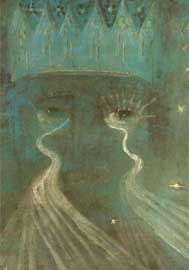 The story of King Roger is based on the life of an enlightened twelfth-century Sicilian king (Roger II), and benefited from Szymanowski’s travels around that large island. The historical King Roger II is famed for having consolidated all the Norman conquests in the Italian peninsula into a single kingdom, and for surrounding himself with an ethnically diverse group of advisers. The opera “is based, broadly speaking, on the Dionysian thesis that only through bodily love can the mysteries of divine love be approached or creative work accomplished.” (NewGrove Dictionary of Music)
The story of King Roger is based on the life of an enlightened twelfth-century Sicilian king (Roger II), and benefited from Szymanowski’s travels around that large island. The historical King Roger II is famed for having consolidated all the Norman conquests in the Italian peninsula into a single kingdom, and for surrounding himself with an ethnically diverse group of advisers. The opera “is based, broadly speaking, on the Dionysian thesis that only through bodily love can the mysteries of divine love be approached or creative work accomplished.” (NewGrove Dictionary of Music)
From the early 1920s, Szymanowski spent much time at his home in Zakopane, finding a rich source of inspiration in music of the Tatra mountain folk for Harnasie and other works. Harnasie was given its premiere in Prague in 1935, and was an enormous critical and popular success at the Paris Opera the following year.
Szymanowski – who apparently made no particular secret of his homosexuality – has been embraced by the modern gay community, many seeing a “gay theme” or “hidden agenda” in King Roger and in the composer’s belief in the pre-Beatles inspiration that “all you need is love.”
Opera At Bard Summerscape 2008 – Details
Karol Szymanowski: King Roger; Harnasie
Tadeusz Szlenkier, tenor (Harnasie solo and Shepherd in King Roger)
Adam Kruszewski, baritone (King Roger)
Iwona Hossa, soprano (Roxane in King Roger)
Wrocław Opera Chorus
American Symphony Orchestra
Leon Botstein, conductor
Directed and designed by Lech Majewski
Choreographed by Noemie Lafrance
Sung in Polish with English supertitles
Sosnoff Theater
July 25, 31, and August 2+ at 8 pm
July 27* and August 3 at 3 pm
Tickets: $25, $55, $75
Thursday Performance: $20, $45, $65
* Opera Talk with Leon Botstein: Sosnoff Theater, July 27 at 1 pm – Free and open to the public
Fisher Center box office: (845) 758-7900 or visit www.fishercenter.bard.edu
Secrets In Chopin’s Heart
 In an article entitled “In Poland, Chopin’s heart may hold secret of his death” from June 21, 2008, the Agence France-Presse discusses the current controversy surrounding the heart of the great Polish composer and pianist, Frédéric Chopin. Although it has always been thought that Chopin died an untimely death due to tuberculosis, some medical experts now posit that the great musician may have instead suffered from cystic fibrosis. The answer lies in the DNA preserved in Chopin’s heart, which was brought back to Poland from France after his death by his sister, per the Chopin’s request. It is now housed in Warsaw’s Church of the Holy Cross, preserved with what appears to be cognac in a crystal urn. Despite the possible medical research benefits, many feel that it is inappropriate to disturb the heart at this point, and opening the urn could cause irreparable damage. Polish officials are waiting for more details on the process before allowing any research to be conducted.
In an article entitled “In Poland, Chopin’s heart may hold secret of his death” from June 21, 2008, the Agence France-Presse discusses the current controversy surrounding the heart of the great Polish composer and pianist, Frédéric Chopin. Although it has always been thought that Chopin died an untimely death due to tuberculosis, some medical experts now posit that the great musician may have instead suffered from cystic fibrosis. The answer lies in the DNA preserved in Chopin’s heart, which was brought back to Poland from France after his death by his sister, per the Chopin’s request. It is now housed in Warsaw’s Church of the Holy Cross, preserved with what appears to be cognac in a crystal urn. Despite the possible medical research benefits, many feel that it is inappropriate to disturb the heart at this point, and opening the urn could cause irreparable damage. Polish officials are waiting for more details on the process before allowing any research to be conducted.
Below is a poetic excerpt from the Agence France-Presse article, regarding the circumstances around Chopin’s flight from Poland and time in France. To read the entire article, visit: afp.google.com
As a Polish emigre in his father’s native France after an 1830-31 uprising of Polish insurgents against the 1795 partition of Poland by Russia, Prussia and Austria, Chopin refused to take a Russian passport.
Thus he was never able to set foot on his native soil after the doomed insurrection.
“The uprising was a drama that ruptured Chopin’s life,” said Michalski [referring to Grzegorz Michalski, director of Poland’s National Fryderyk Chopin Institute], explaining the musician’s desperate homesickness and his dreams of Polish independence.
Described by 19th century German composer Robert Schumann as “cannons hidden among blossoms,” Chopin’s music was and remains a symbol of Poland’s long struggle for freedom.
Nazi Germany banned Chopin’s music for that very reason.
But Michalski recalled that it was a German general, Erich von dem Bach, who saved the heart from oblivion amid a relentless Nazi bombing campaign during the 1944 uprising by Polish partisans in what then was occupied Warsaw.
Anderszewski/Anderszewska In July

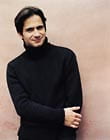 On Thursday July 17th, the musical forces of Piotr Anderszewski (piano) and Dorota Anderszewska (violin) will join together at the Festival Internacional de Música da Póvoa de Varzim in Portugal. This program for this concert of chamber music in the city’s Auditorio Municipal will include Dvorak’s Piano Quintet and Janacek’s Sonata for Violin and Piano. Other artists joining the brother and sister team for this performance are Augustin Dumay (violin), Maxim Rysanov (viola), and Jian Wang (violoncello). See more information about the concert here: http://www.cm-pvarzim.pt/go/festivalinternacionalmusica.
On Thursday July 17th, the musical forces of Piotr Anderszewski (piano) and Dorota Anderszewska (violin) will join together at the Festival Internacional de Música da Póvoa de Varzim in Portugal. This program for this concert of chamber music in the city’s Auditorio Municipal will include Dvorak’s Piano Quintet and Janacek’s Sonata for Violin and Piano. Other artists joining the brother and sister team for this performance are Augustin Dumay (violin), Maxim Rysanov (viola), and Jian Wang (violoncello). See more information about the concert here: http://www.cm-pvarzim.pt/go/festivalinternacionalmusica.
Piotr Anderszewski will also being playing recitals and chamber concerts this month in Bad Kissingen, Germany (July 1), Verbier, Switzerland (July 23 and July 27), and Norfolk, UK (July 31)
Nigel Kennedy At Proms
For the past few years, British violinist Nigel Kennedy has been living in Poland, exploring the country’s rich musical heritage and teaming up with some of Poland’s finest jazz musicians. The Proms Music Festival in London will feature Kennedy twice in one day on July 19th at Royal Albert Hall: in an evening concert of classical music with the BBC Concert Orchestra at 6:30, and a late-night concert with the Nigel Kennedy Quintet at 10:00. Kennedy has said, “People can say I’m a classical violinist if they want to, but I’ve always viewed myself as a musician who plays music and not just a certain part of it.”This concert combination will offer the audience an opportunity to judge Nigel Kennedy’s comment for themselves.
 Nigel Kennedy’s fine ensemble of Polish jazz musicians will be joined by singer Xantone Blacq for the late-night performance. The Nigel Kennedy Quintet includes: Tomasz Grzegorski, saxophone; Piotr Wyleżol, piano; Adam Kowalewski, double bass; and Paweł Dobrowolski, percussion.
Nigel Kennedy’s fine ensemble of Polish jazz musicians will be joined by singer Xantone Blacq for the late-night performance. The Nigel Kennedy Quintet includes: Tomasz Grzegorski, saxophone; Piotr Wyleżol, piano; Adam Kowalewski, double bass; and Paweł Dobrowolski, percussion.
Both concerts will be recorded for broadcast on BBC Two on 26 July, Live on BBC Radio 3, and available as audio on demand for the following week
Kaper Awards
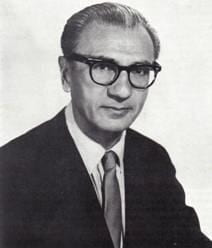 The PMC recently learned of the Bronislaw Kaper Awards for Young Artists, a competition held annually by the Los Angeles Philharmonic. The competition alternates between the piano and strings instrumental categories each year and encourages the development of young and gifted musicians. Named in honor of the late Bronisław Kaper, a renowned Polish film composer who emigrated to the U.S. in 1935 and went on to score over 150 Hollywood films. Kaper served for more than 15 years as a member of the Los Angeles Philharmonic Association’s Board of Directors.
The PMC recently learned of the Bronislaw Kaper Awards for Young Artists, a competition held annually by the Los Angeles Philharmonic. The competition alternates between the piano and strings instrumental categories each year and encourages the development of young and gifted musicians. Named in honor of the late Bronisław Kaper, a renowned Polish film composer who emigrated to the U.S. in 1935 and went on to score over 150 Hollywood films. Kaper served for more than 15 years as a member of the Los Angeles Philharmonic Association’s Board of Directors.
The 2008 Bronislaw Kaper Awards for Young Artists winners were announced after competition for the piano instrumental category was held on stage at Walt Disney Concert Hall on February 16, with a total of eighteen applicants. Both Yu-Hao Chen of Santa Monica and Connie Kim-Sheng of La Crescenta shared first place award ($2,500) on a split decision; Alice Hwang of Brea won the second place award ($2,000); Mason Yu of Irvine won third place award ($1,000); and Vijay Venkatesh of Laguna Nigel was named Most Promising Musician ($500 prize).
John Blacklow, Lucinda Carver, Norman Krieger and Mark Robson served as judges, per their selection by Joanne Pearce Martin, the Los Angeles Philharmonic’s principal keyboardist and Katharine Bixby Hotchkis Chair.
[Information gathered from www.laphil.com/education/competition.cfm]
Detroiter In Warsaw
 Holy Cross Basilica (ul. Krakowskie Przedmieście 3) is the venue for a recital of organ works written by American composers and performed by organist Norah Duncan IV (pictured at left). The concert, which is free of charge, begins at 7:30 p.m. on Thursday, July 10.
Holy Cross Basilica (ul. Krakowskie Przedmieście 3) is the venue for a recital of organ works written by American composers and performed by organist Norah Duncan IV (pictured at left). The concert, which is free of charge, begins at 7:30 p.m. on Thursday, July 10.
Currently an Associate Professor of Music at Wayne State University in Detroit, Mr. Duncan was for over a quarter of a century the organist at that city’s Blessed Sacrament Roman Catholic Cathedral, holding that post under cardinals John Francis Dearden, Edward Szoka and Adam Maida.
The all-American program features organ music written during America’s 232-year history, starting with William Selby, a composer dating from the American Revolutionary War (Fugue in D Major) and reaching to contemporary composer Ralph Simpson (Jacob’s Ladder). Among the many other composers included in the program is one of Polish-American descent, the late Thomas M. Kuras. Also a Detroiter, he is represented by his chorale prelude on the Sicilian Marian hymn, O Sanctissima.
Norah Duncan is the recipient of many awards, both secular and religious acknowledgements of his high musical achievements and outstanding service to both Church and city. An alumnus of Wayne State University, he is also a graduate of the University of Michigan School of Music in Ann Arbor. He prides himself in having been the music director for the papal mass during the visit of Pope John Paul II to Detroit in 1987.
The main sponsor for this musical event is the American Embassy in Warsaw. Additional sponsors include Welcome to Warsaw, BATIDA, and the Kosciuszko Foundation, Inc.
Awards
Nesterowicz Honored
 Michał Nesterowicz has won the 9th International Conducting Competition “Cadaques Orchestra” in Barcelona, one of the Europe’s more prestigious conducting competitions. The jury, chaired by Gennady Rozhdestvensky, chose Michał Nesterowicz as a winner from among 75 candidates from around the world. As a result Nesterowicz will conduct over 30 European symphony and chamber orchestras, including the Wiener Kammerorchester and the BBC Orchestra in Manchester.
Michał Nesterowicz has won the 9th International Conducting Competition “Cadaques Orchestra” in Barcelona, one of the Europe’s more prestigious conducting competitions. The jury, chaired by Gennady Rozhdestvensky, chose Michał Nesterowicz as a winner from among 75 candidates from around the world. As a result Nesterowicz will conduct over 30 European symphony and chamber orchestras, including the Wiener Kammerorchester and the BBC Orchestra in Manchester.
Michał Nesterowicz is 34 years old and is the laureate of numerous conducting competitions, including the Grzegorz Fitelberg Conducting Competition. Until recently he conducted the Polish Baltic Philharmonic in Gdańsk—in 2004, when he became the Conductor and Music Director of the Baltic Phil, he simultaneously became the youngest Music Director in Poland. Since January 2008 he has been the artistic director of the Orchestra Sinfonica de Chile. During his career he has cooperated with outstanding musical personalities such as contralto Ewa Podleś, and film composers Zbigniew Preisner and Jan A.P. Kaczmarek.
Kaspszyk, Kennedy & PCO Win ECHO
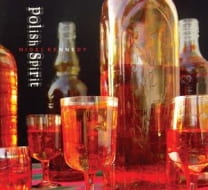 The ‘Polish Spirit’ recording (EMI Classics), performed by the Polish Chamber Orchestra under Jacek Kaspszyk, with Nigel Kennedy as soloist, has received the prestigious ECHO Klassik 2008 award. The 49 awards will be presented in 23 categories during a classical music gala on October 19th, 2008. The winners of this prestigious award are chosen by a jury consisting of members of the German Recording Academy (Phono-Akademie), along with representatives from the world of politics, culture and media. See the list of 2008 winners here: www.echo-deutscher-musikpreis.de.
The ‘Polish Spirit’ recording (EMI Classics), performed by the Polish Chamber Orchestra under Jacek Kaspszyk, with Nigel Kennedy as soloist, has received the prestigious ECHO Klassik 2008 award. The 49 awards will be presented in 23 categories during a classical music gala on October 19th, 2008. The winners of this prestigious award are chosen by a jury consisting of members of the German Recording Academy (Phono-Akademie), along with representatives from the world of politics, culture and media. See the list of 2008 winners here: www.echo-deutscher-musikpreis.de.
Although born in Britain, Kennedy has been living in Poland for some years now, and has become a true champion of all Polish music and musicians, from jazz to classical. With this release, Kennedy highlights two rarely heard Polish Romantic masterpieces: the violin concertos of Emil Młynarski and Mieczysław Karłowicz.
[Information gathered from www.polskieradio.pl and www.billboard.biz]
Drzewiecki 5th In Rachmaninov Competition
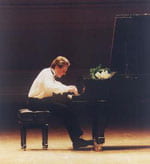 In the history of the biggest Russian piano competitions—those devoted to the output of P. Tchaikovsky, S. Rachmaninov and A. Scriabin—few Polish pianists have been recognized. A diploma awarded to Andrzej Ratusiński at the Tchaikovsky Competition in 1974 was a big achievement. On June 2, 2008 during the Awards Ceremony and Gala concert of the winners for the 4th Sergey Rachmaninov International Piano Competition, Stanisław Drzewiecki became the first Polish award winner for years, winning 5th place as well as the “Special Prize of the Rachmaninov Society” (including tours in Moscow , St. Petersburg, and Great Novgorod).
In the history of the biggest Russian piano competitions—those devoted to the output of P. Tchaikovsky, S. Rachmaninov and A. Scriabin—few Polish pianists have been recognized. A diploma awarded to Andrzej Ratusiński at the Tchaikovsky Competition in 1974 was a big achievement. On June 2, 2008 during the Awards Ceremony and Gala concert of the winners for the 4th Sergey Rachmaninov International Piano Competition, Stanisław Drzewiecki became the first Polish award winner for years, winning 5th place as well as the “Special Prize of the Rachmaninov Society” (including tours in Moscow , St. Petersburg, and Great Novgorod).
The Moscow International House of Music hosted the competition’s recital auditions, performances with the State Academic Symphonic Capella of Russia under the direction of Valeri Polyansky, and the concert of the winners. Thirty-five pianists, prize winners of many international music competitions from 14 countries of the world, were admitted to the Competition. Due to the high level of talent among the contestants, the Jury decided to admit fifteen pianists to the second stage instead of only twelve as specified by the competition’s Rules. The final prizes were awarded to:
- First Prize: Alexander Sinczuk, Russia (Laureateship and $10,000 USD)
- Second Prize: Vyacheslav Griaznow, Russia (Laureateship and $4,000 USD)
- Third Prize: Daniil Sajamow, Russia (Laureateship and $3,000 USD)
- Fourth Prize: Kim Ko Vun, South Korea (Diploma and $1,500 USD)
- Fifth Prize: Stanislaw Drzewiecki, Poland (Diploma and $1,500 USD)
- Sixth Prize: Van Shi Ran, China (Diploma and 1 000 USD)
The Rachmaninov Competition is one of the oldest musical competitions in Russia. The First All-Union Rachmaninov Competition was held in 1982 in the Moscow Conservatoire, since 1993 it has been an international contest. Among past winners were famous pianists like Nikolai Lugansky, Andrei Pisarev, Olga Pushechnikova, Ilia Itin, etc.
Sergey Rachmaninov was born in 1873 in Oneg, in the Novgorod province. During the October Revolution he emigrated to the USA, where he died after 26 years in his estate in Beverly Hills, Los Angeles. His compositional output is impressive, and many recordings exist which exhibit this unequalled virtuoso of the piano and fascinating creator at the conductor’s stand. (Read more about Rachmaninov here)
Award For Kilar’s Krzesany
 Krzesany by Wojciech Kilar has received the award for being the most performed foreign composition in the Czech Republic during last year. These awards for the most popular musicians and composers are given annually by the Czech Association for the Protection of the Copyright of Musical Works (OSA). The awards are given based on the collective data information sent to the association by the TV and Radio stations, cultural institutions and cell phone operators.
Krzesany by Wojciech Kilar has received the award for being the most performed foreign composition in the Czech Republic during last year. These awards for the most popular musicians and composers are given annually by the Czech Association for the Protection of the Copyright of Musical Works (OSA). The awards are given based on the collective data information sent to the association by the TV and Radio stations, cultural institutions and cell phone operators.
The composer was unable to attend the ceremony because of health issues. The award was received by the director of the Polish Institute in Prague, Maciej Szymanowski, instead.
Krzesany is a stylization of a highlander dance, in which the dancers strike their heels together much the same way you strike two stones to create a spark. It was premiered in 1974 and immediately became one of the most popular pieces of Polish concert literature.
Mezo-Arruda Honored & Ipalpiti
 Hungarian cellist László Mezo-Arruda (soloist at the 2007 PMC Paderewski Lecture-Recital, pictured at left) has won the First Prize of the Houston Symphony Ima Hogg Young Artist Competition. László received $5,000 and a concerto appearance with the Houston Symphony on Sunday, July 6, 2008.
Hungarian cellist László Mezo-Arruda (soloist at the 2007 PMC Paderewski Lecture-Recital, pictured at left) has won the First Prize of the Houston Symphony Ima Hogg Young Artist Competition. László received $5,000 and a concerto appearance with the Houston Symphony on Sunday, July 6, 2008.
Later in July, aficionados can hear László at various venues in Los Angeles as part of the International Laureates Festival as a member of iPalpiti. For the full schedule of Festival events, click: www.youngartists.org/events2008.htm
Minister Of Culture Awards
For the 12th time the annual awards of the Polish Minister of Culture (see www.mkidn.gov.pl for more about the Ministry) were given to deserving artists for lifetime or outstanding achievements. This year, during the ceremony at the Royal Castle in Warsaw, there were 16 recipients of the award:
Theatre
Teresa Budzisz-Krzyżanowska, actress, professor of the Theater Academy in Warsaw
Maja Komorowska, actress of the “Contemporary Theatre” in Warsaw
Honorary Theatre Award
Adam Hanuszkiewicz, director
Film
Tadeusz Chmielewski, director, screenwriter
Allan Starski, set designer
 Music
Music
Krzysztof Penderecki, composer, conductor
Agnieszka Duczmal (pictured at right) – conductor, artistic director of the “Amadeus” Chamber Orchestra of the Polish Radio
Zofia Helman-Bednarczyk – chairman of the Department of Music Theory and Esthetics
Literature
Ludwik Jerzy Kern – poet, children book author
Piotr Matywiecki – poet, esseist, literary critic
Visual Arts
Tadeusz Dominik – painter
Andrzej Kostołowski – art historian
Folk Art
Anna Staniszewska – folk artist
Culture Propagation
Krzysztof Droba – theoretician of culture, critic
Cultural Heritage Preservation
Maria Bokszczanin – Polish language scholar
Annual Honorary Award for lifetime achievement in culture and education
Polish Librarian Association
Festivals
Warsaw Summer Jazz Days
 Warsaw Summer Jazz Days is one of the most important jazz festivals in Poland, and Europe. The organizers attract major jazz stars to come and perform during the festival each year and also invite young talent to showcase their art. The result is a very diverse and attractive festival, where fans of any style of jazz can find a concert to suit their taste. This year is no exception. Marquee acts include: “Return to Forever,” Pat Metheny, Bobby McFerrin, Kenny Garrett, and Charlie Haden. The festival also has days dedicated to artists of different nations, including: Ukraine, Romania, Austria, Slovakia, Greece, and Poland. The festival started on June 25 and will conclude on July 21.
Warsaw Summer Jazz Days is one of the most important jazz festivals in Poland, and Europe. The organizers attract major jazz stars to come and perform during the festival each year and also invite young talent to showcase their art. The result is a very diverse and attractive festival, where fans of any style of jazz can find a concert to suit their taste. This year is no exception. Marquee acts include: “Return to Forever,” Pat Metheny, Bobby McFerrin, Kenny Garrett, and Charlie Haden. The festival also has days dedicated to artists of different nations, including: Ukraine, Romania, Austria, Slovakia, Greece, and Poland. The festival started on June 25 and will conclude on July 21.
For detailed festival program and information please visit: www.adamiakjazz.pl.
Toruń – Music And Architecture
 The 12th edition of the “Toruń – Music and Architecture” Festival started on Jun 28 and will conclude on August 31. The goal of the festival is to present the world’s greatest music in the most beautiful buildings of the old-town of Toruń. The concerts will take place in the Town Hall, Templar Castle ruins, St. John’s Basilica, the Castle Moat, the Scientific Society and Artus’ Court. The program of the festival is very diverse and includes symphonic, vocal, and piano chamber concerts and recitals, but also film music and salsa-style music. For more information please visit www.tos.art.pl/letni_fest.html.
The 12th edition of the “Toruń – Music and Architecture” Festival started on Jun 28 and will conclude on August 31. The goal of the festival is to present the world’s greatest music in the most beautiful buildings of the old-town of Toruń. The concerts will take place in the Town Hall, Templar Castle ruins, St. John’s Basilica, the Castle Moat, the Scientific Society and Artus’ Court. The program of the festival is very diverse and includes symphonic, vocal, and piano chamber concerts and recitals, but also film music and salsa-style music. For more information please visit www.tos.art.pl/letni_fest.html.
Jazz In The Old Town
The Festival “Jazz at the Old Town Square” is one of the most popular and well-attended jazz festivals in Poland. Three to four thousand people gather each Saturday for a concert during July and August. Each summer, the Festival attracts 50 thousand jazz enthusiasts.
Jazz at the Old Square is one of the longest running European Jazz Festivals as well. It is open to the public, giving everyone a chance to enjoy performances of the best and the biggest jazz musicians. Jazz at the Old Town Square is a cultural representation of both Warsaw and Poland in Europe.
This year’s performers include stars of both European and American jazz, such as:
Dino Saluzzi, Tomasz Stańko, Michal Urbaniak, Scott Hamilton, Bill Evans, Bobby Watson, James Weidman, Pierre Blanchard, Dave Liebman, Leszek Mozdzer, Paul Brody, Kevin Mahogany, Ron Jackson, Dr. Lonnie Smith, Dean Brown, The Avishai Cohen, Richard Galliano, Kenny Wheeler, John Taylor, David Murray Quartet, Lee Konitz Quartet, Lars Danielsson Trio & Ceacilie Norby “Melange Blue.”
For details, please visit: www.jazznastarowce.pl.
Chopin Festival In Paris
 This year’s Chopin Festival in Paris is entitled “Chopin en miroir” [Chopin in the mirror] and runs from the 15th of June to the 14th of July. The title implies the confrontation that is intended in each concert, either between Chopin and one of his contemporaries (Liszt, Schumann, Alkan, Mendelssohn) or between Chopin and a close successor, in terms of time or space (Brahms in Germany, Fauré and Debussy in France, Scriabin and Rachmaninov in Russia, Grieg in Norway). The Festival will display pianists at every point in their career, from still at the Conservatory to on the international stage. For more information and a full schedule of concerts, please visit: www.frederic-chopin.com.
This year’s Chopin Festival in Paris is entitled “Chopin en miroir” [Chopin in the mirror] and runs from the 15th of June to the 14th of July. The title implies the confrontation that is intended in each concert, either between Chopin and one of his contemporaries (Liszt, Schumann, Alkan, Mendelssohn) or between Chopin and a close successor, in terms of time or space (Brahms in Germany, Fauré and Debussy in France, Scriabin and Rachmaninov in Russia, Grieg in Norway). The Festival will display pianists at every point in their career, from still at the Conservatory to on the international stage. For more information and a full schedule of concerts, please visit: www.frederic-chopin.com.
Rencontres Internationales Frédéric Chopin
The Rencontres Internationales Frédéric Chopin [International Frédéric Chopin Festival] was created in 1997 to pay homage to this composer whose name will always be associated with George Sand’s House. Organized every year, for eight consecutive days in the second half of July, this event will completely immerse you in the world of Chopin through concerts, master classes and lectures given by specialists from all over the world. This year the Festival will run from July 18-25.
Among the pianists, Nelson Freire, Jean-Marc Luisada and Dominique Merlet, the lecturers Jean-Jacques Eigeldinger, Jean Roy and André Tubeuf and the teachers Milosz Magin and Janusz Olejnicsak, can be mentioned. The opening of the festival begins, every year, with a concert-reading given with the windows open in the Home of George Sand in the presence of Sonia Rykiel, honorary president of the festival. Young soloists from well-known musical establishments in France and abroad are accommodated in the residence for the whole week, taking part in the master classes and playing in the closing concert.
The master classes and lectures of the festival take place at the Théâtre de la Châtre, whereas the concerts take place in Nohant, in the sheepfold of the George Sand Estate. For more information and a full schedule of concerts, please visit: www.pays-lachatre-berry.com.
Three Baroques Festival
The Three Baroques Festival will take place between July 14 and 23 in Wrocław. The name of the festival relates to the synthesis of cultures melding in Wrocław over time: baroque music styles from Italy, France and Germany. The festival is organized by the “Canor” Early Music Foundation in Wrocław.
This year the festival will feature artists from Poland as well as other European countries, including: Arte dei Suonatori orchestra, performing on period instruments and accompanying esteemed soloists: Aline Zylberajch (France; harpsichord), Maria Keohane (Sweden; soprano), Bolette Roed (Denmark; block flute), Martin Gester (France; harpsichord, organ, conductor), Alexis Kossenko (France; flutes), Andreas Arend (Germany; theorb, lute), Allan Rasmussen (Denmark; harpsichord, organ).
For more information about the festival and a detailed program please visit: www.3baroki-wroclaw.pl.
Oliwa International Organ Festival
 The International Organ Music Festival in Oliwa Cathedral is the oldest in Poland and one the oldest in festivals of its kind in the world. The festival started on June 24, 2008 and the concerts will continue until August 26, held on every Tuesday and Friday.
The International Organ Music Festival in Oliwa Cathedral is the oldest in Poland and one the oldest in festivals of its kind in the world. The festival started on June 24, 2008 and the concerts will continue until August 26, held on every Tuesday and Friday.
This year, in addition to Polish organists, audiences will hear organ virtuosos from Argentina, Belgium, France, Germany, Italy, and Norway. They will present a varied selection of organ repertoire, including works by composers not previously performed in Poland. For more information please visit: www.filharmonia.gda.pl.
Discography
Saxophone Romances: A Review
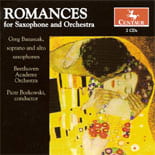 Romances for Saxophone and Orchestra |
Romances for Saxophone and Orchestra |
Joanna Bruzdowicz: Largo for Soprano Saxophone and String Orchestra; David Morgan: Three Vignettes for Alto Saxophone and String Orchestra; Subaram Raman: Aria for Alto Saxophone and String Orchestra-Appassionato; Wojciech Kilar: Vocalise; Heitor Villa-Lobos: Bachianas brasilieras #5 (Aria only) for Saxophone and Celli; Alan Hovhaness: Concerto for Saxophone and String Orchestra, Op. 344; James Leatherbarrow: Don Quixote in Love for Soprano Saxophone and Orchestra; and Eugene Bozza: Andante ma non troppo (arr. Hunter Ewen) |
Greg Banaszak, soprano and alto saxophones; Beethoven Academy Orchestra, Piotr Borkowski, conductor |
CRC 2889/2890
Saxophonist Greg Banaszak has released a critically acclaimed 2-CD set devoted to a diverse collection of saxophone repertoire. “Romances for Saxophone and Orchestra” also features the Beethoven Academy Orchestra of Krakow, Peter Borkowski, conductor, as well as several excellent Polish soloists. This is the first recording of the Beethoven Academy Orchestra to be made available internationally, through the U.S.-based record company Centaur Records Inc. According to Mr. Banaszak, “This CD is a testament to Polish culture and diversity, bringing together Polish musicians, artists, composers, and recording engineers on a collaboration that represents the rich and important contributions of past and present Polish artists,” a project that was five years in the making. (from a letter to the author dated March 17, 2008)
Featured on this recording are two pieces written for film scores by two of Poland’s greatest, film composers: Joanna Bruzdowicz and Wojciech Kilar. Joanna Bruzdowicz’s Largo for Soprano Saxophone and String Orchestra was written for the film Jacquot De Nantes by Agnès Varda, a director with whom Ms. Bruzdowicz collaborates often. The melody carried by the saxophone throughout is at the same time simply beautiful and raggedly eerie. Mr. Banaszak expertly maneuvers through both the flowing lyrical sections as well as those that are more jauntingly dissonant. As it is described in the album’s liner notes, “The quasi-minimalistic and haunting undulations of the latter theme bring the piece to an inconclusive end, allowing listeners an opportunity to exercise their imaginations as to a deeper meaning.”
The Vocalise, from Wojciech Kilar’s score for the Roman Polanski film The Ninth Gate is a beautifully evocative piece of music, like so many of Kilar’s works. Originally sung by soprano Sumi Jo for the film soundtrack, the soprano sax easily takes up this mournful tune for this arrangement and carries it to its fullest emotional potential. Mr. Banaszak and the Beethoven Academy Orchestra create a seamless blend of sound on this track. The addition of the harpsichord, while unusual in such a contemporary orchestral work, is very well placed in this composition, and the part is executed with skill and feeling by soloist Marta Klimczyk.
Mr. Banaszak, Mr. Borkowski, and the Beethoven Academy Orchestra are to be commended for this collaboration, bringing together Poles and Americans, as well as so many other cultures that are represented by the other composers on the recording, and sharing this music with the world.
[KC]
New From DUX
 Clarinet Works
Clarinet Works
Marcel Chyrzyński: Three Preludes for clarinet and piano, Quasi Kwazi I, II and III for clarinet solo; Isang Yun: Riul for clarinet and piano; Dawid Jarzyński: Partita for clarinet solo; Paul Patterson: Conversations for clarinet and piano
Dawid Jarzyński – clarinet, Anna Czaicka – piano
DUX 0622
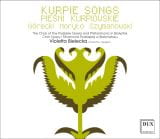 Pieśni Kurpiowskie
Pieśni Kurpiowskie
Henryk Mikołaj Górecki: Five Kurpian Songs for mixed choir a capella; Stanisław Moryto: Five Kurpian Songs for female choir a capella; Karol Szymanowski: Six Kurpian Songs for mixed choir a capella
Marta Wróblewska – soprano, Maciej Bogumił Nerkowski – tenor, The Choir of The Podlasie Opera and Philharmonic in Białystok, Violetta Bielecka – conductor
DUX 0653
 Beethoven • Rachmaninov • Brahms: Tria Fortepianowe
Beethoven • Rachmaninov • Brahms: Tria Fortepianowe
Beethoven: Piano Trio in C-minor, Op. 1 Nr 3; Rachmaninov: Piano Trio in G-minor “Élégiaque”; and Brahms: Piano Trio in C-minor, Op. 101
Trio Cracovia: Krzysztof Śmietana – violin, Jerzy Tosik-Warszawiak – piano, and Julian Tryczyński – cello
DUX 0626
Skowronski In ARG
The most recent volume of the American Record Guide (May/June 2008, page 243) features a brief comparison of two recently available recorded performances including the same piece. The piece is Sonata in D Minor, Opus 9 by Karol Szymanowski, and the performances are by internationally recognized violinist and recording artist Mr. Vincent P. Skowronski and 2005 1st Place prize winner of the Third Paganini Moscow International Violin Competition, Mr. Ivan Pochekin. Says the reviewer, “Mr. Pochekin clearly has an affinity for the sonata, but he doesn’t have Vincent Skowronski’s throaty tone or create the wonderful sense of life-and-death drama that Skowronski does.” For more information about Mr. Skowronski, including his full discography and how to purchase the CDs, please visit his website: www.skowronskiplays.com.
Performances
“Łańcuch” Lutosławski Festival
 The 5th edition of the “Łańcuch” [Chain] Witold Lutosławski Festival took place in Warsaw between June 18 and 22. The festival is organized by Channel 2 of Polish Radio and Lutosławski Society in Warsaw. There were 5 concerts during the festival, all of them performed by young, talented artists.
The 5th edition of the “Łańcuch” [Chain] Witold Lutosławski Festival took place in Warsaw between June 18 and 22. The festival is organized by Channel 2 of Polish Radio and Lutosławski Society in Warsaw. There were 5 concerts during the festival, all of them performed by young, talented artists.
Day 1 featured dance interpretations of Lutosławski’s Dance Preludes with improvisations by Száblocs Esztényi. Day 2 was a showcase for the piano-percussion ensemble “Kwadrofonik,” who performed works by Bartok, Lutosławski and Crumb. Day 3 featured an electronic project concert entitled “Spots on the Sun,” prepared by Agata Zubel and Cezary Duchnowski with Andrzej Bauer and Ewa Guziołek-Tubulewicz. Day 4 showcased music students who performed several multimedia projects, sponsored by BGŻ (Bank Gospodarki Żywnościowej). The final day was filled with a concert of the Lutosławski Youth Orchestra, conducted by Andrey Boreyko with violinist Agata Szymczewska. They performed Lutosławski’s Chain III, Partita for violin and orchestra, and Concerto for Orchestra.
Golka On Fire
 Winner of the 2008 Gilmore Young Artist Award and protégé of José Feghali, 20-year-old pianist Adam Golka performed at the Colorado Music Festival. This first-generation Polish-American played the virtuosic Brahms Piano Concerto No. 1 with Michael Christie and the Festival Orchestra on Friday, June 27 at the Chautauqua Auditorium in Boulder, CO. Kelly Dean Hansen wrote the following about Golka for the Daily Camera on June 27th:
Winner of the 2008 Gilmore Young Artist Award and protégé of José Feghali, 20-year-old pianist Adam Golka performed at the Colorado Music Festival. This first-generation Polish-American played the virtuosic Brahms Piano Concerto No. 1 with Michael Christie and the Festival Orchestra on Friday, June 27 at the Chautauqua Auditorium in Boulder, CO. Kelly Dean Hansen wrote the following about Golka for the Daily Camera on June 27th:
In his tenure, Christie has a history of bringing young and extraordinarily gifted soloists to the Chautauqua stage… But 21-year-old Adam Golka may have been the most memorable of them all… The precocious Golka took the monumental score, dashed it off with seeming effortlessness, and embraced, rather than feared it… Golka was affable and charming in his intermission interview, and genuinely grateful for the opportunity to show his artistry.
Golka, a Houston native, also returned to his hometown for a performance of the Brahms with the Houston Symphony on June 20th. This month, on Wednesday, July 30, Golka will give a lecture about Interpretation, entitled “Why play the same musical master works over and over again?” at the 2008 Dakota Sky International Festival in Sioux Falls, SD (July 17-31).
Anniversaries
Born This Month
- July 04, 1904 – Artur MALAWSKI, composer (d. 1957)
- July 06, 1837 – Władysław ŻELEŃSKI, composer (also a doctor of philosophy, d.1921)
- July 09, 1931 – Eugeniusz KNAPIK, composer
- July 10, 1936 – Jan Wincenty HAWEL, composer and conductor
- July 10, 1835 – Henryk WIENIAWSKI, violin virtuoso & composer (d. 1880, Moscow)
- July 10, 1929 – Tadeusz STRUMIŁŁO, musicologist (d. 1956)
- July 13, 1775 – Antoni Henryk RADZIWIŁŁ, composer, cellist, patron of arts (d. 1833)
- July 14, 1926 – Jan KRENZ, conductor & composer
- July 16, 1947 – Grażyna PSTROKOŃSKA-NAWRATIL, composer
- July 17, 1932 – Wojciech KILAR, composer
- July 22, 1930 – Leoncjusz CIUCIURA, composer
- July 23, 1884 – Apolinary SZELUTO, composer (Young Poland group, d. 1966)
- July 26, 1928 – Tadeusz BAIRD, composer (d. 1982)
- July 26, 1922 – Andrzej KOSZEWSKI, composer (choral music)
- July 29, 1943 – Marta PTASZYŃSKA, composer & percussionist
- July 31, 1810 – Julian FONTANA, close friend and musical associate of Chopin (d. December 1869)
Died This Month
- July 1, 2001 – Halina CZERNY-STEFANSKA (b. 1922), pianist
- July 6, 1911 – Kazimierz HOFMANN (b. 1842), pianist, composer, father of the renowned virtuoso and director of Curtis Institute, Józef Hofmann
- July 8, 1906 – Franciszek BORNIK (b. 1870), priest, conductor, writer
- July 21, 1964 – Zygmunt SITOWSKI (b. 1906), musicologist
- July 23, 1829 – Wojciech BOGUSŁAWSKI (b. 1757), the first theatre director in Poland, the author of several opera libretti (set by J. Stefani and J. Elsner)
- July 25, 1831 – Maria SZYMANOWSKA(b. 1789), pianist & composer
